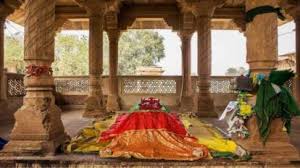Tansen’s grave ‘deserves to be protected’: Madhya Pradesh HC denies nod for religious, cultural activities at Gwalior monument

In a major move to preserve national heritage, the Madhya Pradesh High Court has denied a plea to hold religious and cultural events at the tomb of Tansen in Gwalior. The decision reinforces that legal protection of historic monuments must come before public sentiment, even for traditions held in reverence for centuries.
The court ruled on a petition filed by Sabla Hasan, who wanted to organize an urs, a Sufi commemorative event, at the site. However, the High Court sided with the Archaeological Survey of India (ASI), which objected to such events due to the tomb’s status as a protected monument.
Why the Petition Was Rejected
Sabla Hasan’s petition argued that the urs was a long-standing tradition at Tansen’s tomb. Yet, the ASI raised concerns over unauthorized activities that had taken place there in the past. These included electricity installations, large public feasts, and even games like cricket and football—none of which had ASI’s approval.
Citing these violations, the court noted that no one had received legal clearance for these events. Since the tomb is a protected site under the Ancient Monuments and Archaeological Sites and Remains Act of 1958, any public event requires prior permission.
The court also pointed out that the petitioner had omitted important facts. For instance, they failed to mention that the ASI had already refused permission for the gathering.
ASI’s Role and Concerns
The ASI’s opposition was grounded in the need to protect heritage. Officials reported multiple violations at the site over the years. These include setting up infrastructure without approval and leaving the premises littered after public gatherings.
In earlier warnings, the ASI had asked organizers to avoid such activities. Still, the events continued without following due process.
Because of these issues, the High Court found the ASI’s stance reasonable. It emphasized that heritage monuments should not become venues for events that could damage them.
Tansen’s Tomb: Why It Matters
Tansen was one of the most celebrated figures in Indian classical music. As one of Akbar’s “Navaratnas,” or nine jewels, he left a deep mark on Hindustani music. His tomb in Gwalior has drawn artists, scholars, and spiritual followers for generations.
The tomb is part of a larger historic complex near the Gwalior Fort. It has been recognized as a monument of national importance by the ASI. Moreover, the government organizes the Tansen Music Festival nearby every year to honor his legacy.
Because of this, any damage to the tomb would not just affect local culture but would also harm India’s collective heritage.
A Debate Between Tradition and Preservation
While many people admire the cultural importance of the urs, conservationists warn that unregulated events put monuments at risk. Public gatherings often lead to littering, wear and tear, and even illegal constructions.
Activists like Ashish Chaturvedi have spoken out about the poor state of heritage sites in Gwalior. He welcomed the court’s verdict and stressed the need for regular maintenance and stronger enforcement.
“This is a step in the right direction,” Chaturvedi said. “If we truly value Tansen’s legacy, we must protect the spaces that preserve it.”
Past Problems at Gwalior’s Heritage Sites
Tansen’s tomb isn’t the only site under threat. Other associated places, such as his birthplace in Behat and his meditation spot near Gwalior, have also suffered from encroachments and neglect. In some areas, illegal buildings have cropped up. In others, trash piles up near historical structures.
Authorities did act in 2021 by removing some encroachments. However, consistent protection remains a challenge. The court’s latest order could push local and state bodies to act more decisively.
What the Verdict Means Going Forward
This ruling sets a clear precedent. Any event at a protected site like Tansen’s tomb now needs proper paperwork and ASI’s consent. Sentiment or tradition cannot override the law.
Importantly, the court’s message goes beyond one event. It asks people to shift their mindset—from one of possession to one of preservation.
We can still honor historical icons like Tansen. But we must do so in ways that don’t risk damaging the very sites that keep their memory alive.
Final Thoughts
The Madhya Pradesh High Court has drawn a line that protects the country’s past. With this decision, it sends a strong signal that heritage isn’t just to be remembered—it must be respected and conserved.






